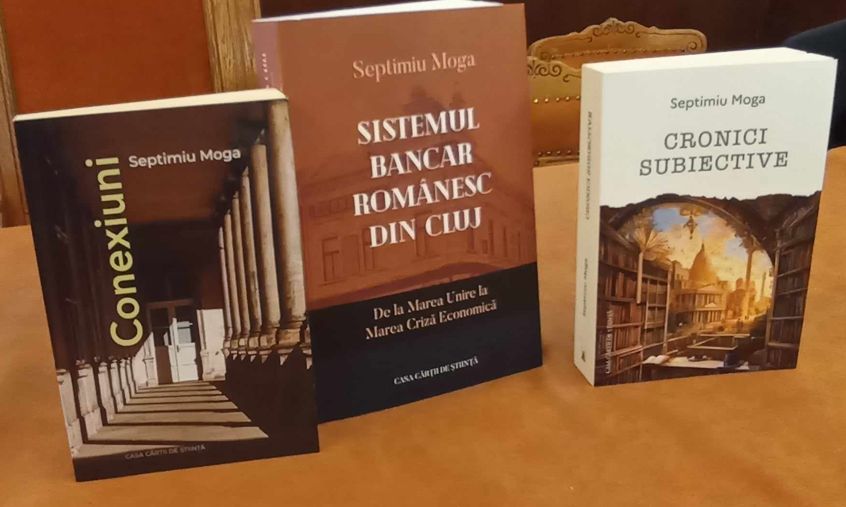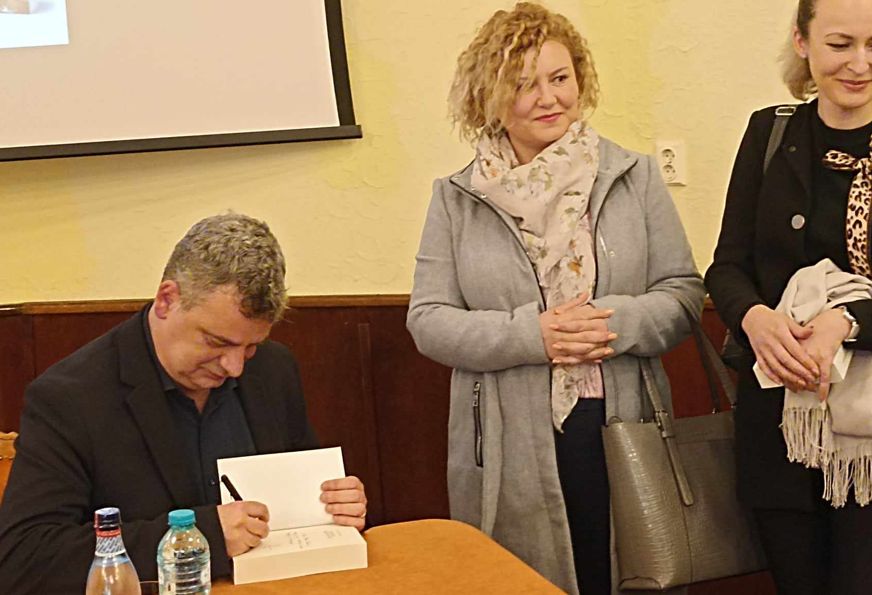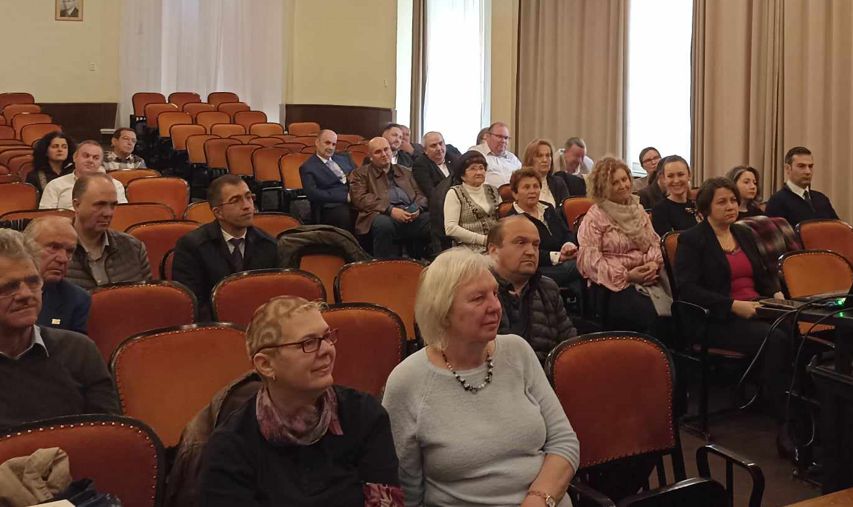present
“Subjective Chronicles”, the new volume signed by the writer-financier Septimiu Moga, brings to the public “spirits and ghosts” from Cluj’s fascinating but lesser-known past, through events and places full of history, of incredible relevance.
Septimiu Moga launched his new volume “Subjective Chronicles”, during an event hosted by the “Lucian Blaga” Central University Library in Cluj-Napoca/Photo: monitorulcj.ro
From his passion for history, embodied in the systematic study of the history of Cluj banks, the writer-financier Septimu Mureșan launched, on Thursday, in the “Ion Mușlea” Hall of the “Lucian Blaga” Central University Library in Cluj-Napoca, his new volume dedicated to fascinating stories of Cluj, but not only, under the title “Subjective Chronicles”.
READ ALSO:
Writer-financier Septimiu Moga launches his book “Subjective Chronicles” on Thursday
“A happy event, celebrated in the week in which the International Book Day is celebrated.
Septimiu Moga made it a habit to publish a book every two years, and today we can happily present a new volume signed by his lordship – «Subjective Chronicles»”, said Professor Marius Mureșan at the opening, who recalled that the Central University Library (BCU) “Lucian Blaga”, the host of the event, organized the book exhibition “People of Cluj banks and their books”.
The “Subjective Chronicles” of Septimiu Moga, a foray into the past stories of Cluj
The first steps concern the systematic research on Cluj banks from the interwar period, started by Septimiu Moga a few years ago. Thus, following the stages of research at the archives in Cluj, Sibiu and Bucharest, as well as from the contextualization of the events that took place in the Romanian banking system, the writer-financier Septimiu Moga ingeniously capitalized on the aspects studied in a new volume.
Thus, Moga offers the public a series of texts that capitalize on the economic articles signed by Victor Slăvescu, the stylistic and philosophical jewels published in the press of the time by Lucian Blaga, the articles of Pamfil Șeicaru or Adrian Maniu, etc.
“The volume presented today is the third in the series that I have initiated for several years now. The first volume, “Connections”, I published during the pandemic, in 2022 I published the book “The Romanian banking system in Cluj – from the Great Union to the Great Economic Crisis” (Casa Carții de Știința, 2022), and the book “Subjective Chronicles ”, which I bring to the public today, includes, like the first volume, thoughts and facts, places and people encountered during my scientific endeavors.
If the scientific work must respect the rigor of objectivity, “Subjective Chronicles” are small articles (for this reason I also called them “chronicles”) either posted on social networks or published in the press over time, and which do not they are not necessarily linked by content, but by the fact that, being concerned with banks, I came across some facts there, with people that exceed the strict framework of research. And which I thought were interesting to remain for the readers from Cluj and from the country, because they touch on problems from Cluj, events that happened during the interwar period, or after this period, are lesser known personalities of Cluj.
I cannot carelessly pass by the Metropol Palace in Cluj, knowing that Vasile Goldiș, Ion Lapedatu, Victor Bontescu, Petru Poruțiu, bishops Iuliu Hossu and Traian Frentiu gathered there, at the beginning of Greater Romania, to lay the foundations of a bank what could be one of Romania’s largest financial institutions.
Or I can feel close, passing on Gheorghe Șincai street, the terrible moments that Iuliu Hațieganu went through, during the persecution of the 1940s-1950s. Or, if we enter Mihai Eminescu street, we can feel the heavy steps of doctor Iuliu Hațieganu who, struck by a terrible drama, laid the foundations of the current “Babeș” park.
The aspects of the past that I researched, let’s say economic events, economic aspects of banks, many of these can be traced to the present as they have similar causes, and this gave me the courage to make these “Subjective Chronicles” for to bring to light some elements that seemed like ballast, but which have in them a good dose of actuality, but also things that can become interesting topics in time”, said Septimiu Moga for monitorulcj.ro
Readers can find in the contents of the book pages dedicated to “Cluj hospitals of yesterday and today”, “Spirits and ghosts on Mihai Eminescu Street in Cluj”, but also texts that refer to “The Failed State”, to “The First Bank of Cluj” or about “Codex aureus . . . Fiscal.”
“Reference works for the history of Romania”
Professor Marcela Sălăgean appreciated the works signed by the writer-financier Septimiu Moga and showed that the themes addressed by the author bring back fragments of the past of the Romanian banking system and shed more light on the role played by prominent people of Cluj in the development Romania. Moreover, the new volume signed by Septimiu Moga, “Subjective Chronicles”, brings back to the public’s attention the places and streets in the city, silent witnesses of the events in the history of Cluj.
“Septimiu Moga is known in the country as a historian. The second volume published, which refers to the Romanian banking system in Cluj from the interwar period until the economic crisis, has already become a reference work in Romanian universities for those who study not only the history of the banking system, but also the history of Romania interwar

“Subjective Chronicles”, the new volume signed by Septimiu Moga, is a book that I liked a lot, because through these chronicles an incursion is made into the history of places and local elites. It is a book that is addressed to young people, less familiar with the past and present of Cluj, Romania or other places visited. At the same time, it is a volume intended for experienced people, who know the politics and history of the city”, said Professor Marcela Sălăgean.
Who is Septimiu Moga?
Born in Cluj-Napoca in 1968, Septimiu Moga followed, after graduating from the Faculty of Economic Sciences in Cluj, an economic career, working continuously at the National Bank of Romania in his hometown. In 2017, his older passion for history materialized in the systematic study of the history of Cluj banks, starting his doctoral studies at the Faculty of History and Philosophy of the University of Cluj. Thus, in addition to articles in local newspapers or in the “Revista de Educație Financiăra” from Bucharest, he published in specialized journals studies related to the history of Cluj banks, monetary unification or the economic situation of Romania in the interwar period, especially during the economic crisis .

As editorial appearances, the book “The Romanian Banking System in Cluj – from the Great Union to the Great Economic Crisis” (Casa Carții de Știință, 2022) appeared under his signature, while also collaborating on a series of collective volumes: “Multiculturalism in Transylvania. After the Paris Peace Conference” (Science Book House, 2019), “The year 1940 in the history of Europe. Between expansion and decline” (Casa Carții de Sciintă, 2019), “Romania after the Great War. Political-diplomatic challenges 1919–1920” (Mega, 2021). At the same time, in 2020, he published the book of essays “Conexiuni” (Casa Carții de Șiinţă).

In addition to his basic profession and the study of History, Septimiu Moga also likes to walk the streets of the city where he lives or which he visits, walking means for him not only a way to relax, but also to remember history of places and significant buildings in the cities, of the personalities who gave the names of the streets, of the events that occurred over time in the places where the steps take him.
Read monitorulcj.ro and on Google News
READ ALSO:
Tags: Septimiu Mogas Subjective Chronicles foray stories Cluj pass people places full history care
-









